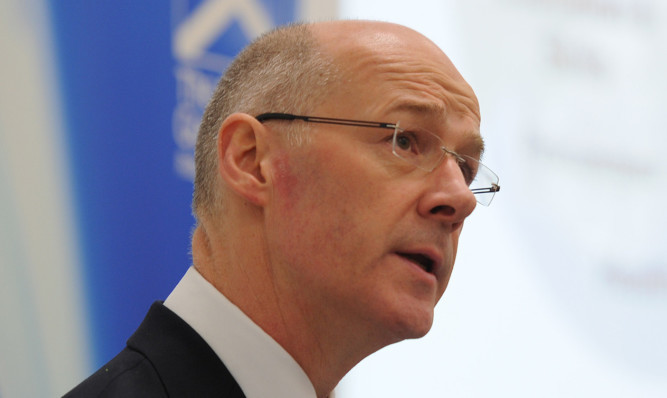Senior SNP MSPs have accused the UK Government of trying to govern Scotland by diktat, acting as judge and jury over devolution and warning Holyrood “it’s our way or the highway” on austerity.
Deputy First Minister John Swinney joined SNP MSPs on Holyrood’s Finance Committee to attack the tone of the devolution settlement offered by the UK Government.
Mr Swinney reiterated the First Minister’s warning the Scottish Government will not give legislative consent to a settlement that does not provide a “fair deal” to Scotland.
Eyebrows were also raised over the role of Lord Andrew Dunlop as a special adviser to the UK Treasury in the devolution negotiations, alongside his role as Scotland Office Minister tasked with representing Scottish interests on the UK Cabinet.
SNP MSP John Mason, the committee’s deputy convener, said: “The committee is concerned about the level of constraint implied in the (Enduring Settlement) command paper, which states: ‘The fiscal framework must require Scotland to contribute proportionally to fiscal consolidation at the pace set out by the UK Government across devolved and reserved areas’.
“The tone of that says to me that this is effectively a diktat, that the UK Government will decide, and that does concern myself and the committee.”
Mr Swinney said: “I don’t support those words, they’re not my words and they don’t represent my position.
“I think the whole point of devolution, the Smith Commission and all of the debate that is going on here, is about giving this parliament greater flexibility to take alternative sets of decisions.
“Now, I accept, and I have been pretty clear about this, that there will be a relationship about fiscal decisions that take place within Scotland and the UK fiscal framework.
“I accept that we’re living within a United Kingdom and there will be certain constraints of the fiscal architecture.
“But the wording in that quote has a tone about it which essentially I read to say: ‘It’s our way or the highway’. I don’t think that’s acceptable.”
Mr Mason also suggested Westminster was against employing an independent arbiter to resolve disputes over issues such as block grant allocation.
“Everything I pick up from Westminster is that they are the judge and the jury, they will make all of the decisions, they will not accept and independent arbiter,” he added.
Mr Swinney said: “I can understand why Mr Mason might come to that conclusion but the Smith Commission has set out that there has to be a fair fiscal framework in place.
“The UK Government has agreed to implement the conclusions of the Smith Commission in full, in its entirety, and I think some of these judgements are implicit as part of that process.”
Scotland’s fiscal framework is currently being negotiated at the Joint Exchequer Committee (JEC), with Mr Swinney representing the Scottish Government supported by the General Secretary of Finance Alison Stafford and other officials.
The UK Government is represented by Chief Secretary to the Treasury Greg Hands. He is supported by Permanent Secretary to the Treasury Sir Nicholas MacPherson and Lord Dunlop.
Former First Minister Alex Salmond recently urged Sir Nicholas to resign over his allegedly partisan role in the independence referendum and Mr Swinney questioned the Conservatives’ respect for Scotland when they elevated former Tory policy adviser Andrew Dunlop to the Lords and appointed him as Scotland Office Minister.
Mr Swinney today revealed that Lord Dunlop, who advised Margaret Thatcher on the poll tax, is now advising the Treasury on Scotland’s fiscal framework.
He said: “The Chief Secretary to the Treasury is accompanied, and if I get this wrong I’m sure the UK Government will challenge it, by Lord Dunlop not in his capacity as the Parliamentary Under-Secretary of State at the Scotland Office but in his capacity as a special adviser to the Treasury.
“So I will leave that with the committee to mull over.”
